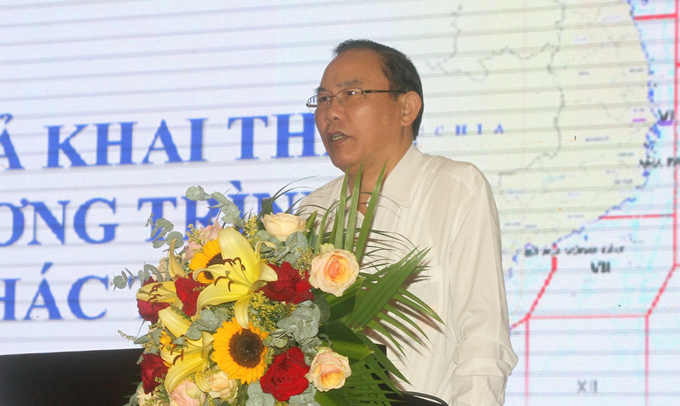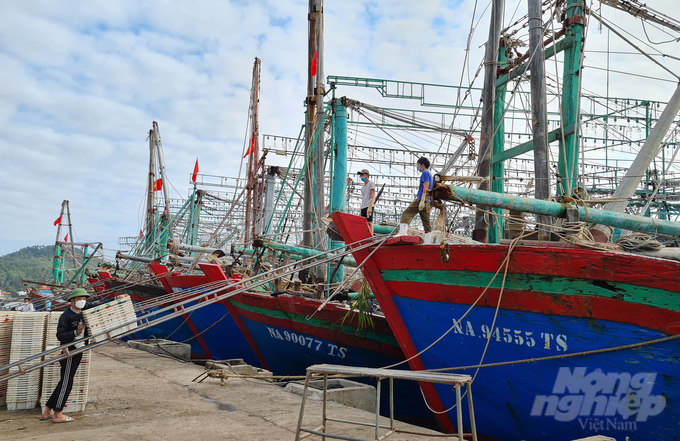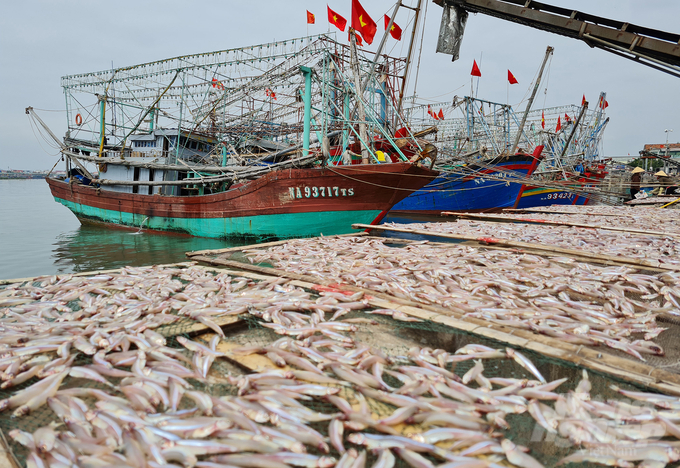May 24, 2025 | 16:23 GMT +7
May 24, 2025 | 16:23 GMT +7
Hotline: 0913.378.918
May 24, 2025 | 16:23 GMT +7
Hotline: 0913.378.918

Deputy Minister Phung Duc Tien urged the aquacultural sector to seize the opportunity and remove the IUU yellow card issued by the European Commission. Photo: Viet Khanh.
Deputy Minister of Agriculture and Rural Development Phung Duc Tien held a conference on May 15 in Nghe An province to discuss solutions to improve the efficiency of fishing production. Consequently, these solutions will help expedite the schedule to remove the IUU yellow card issued by the European Commission.
According to statistics, Vietnam's total fishing output in 2022 reached 3.86 million tons. Namely, marine fishing output reached 3.66 million tons; domestic fishing output reached 198 thousand tons (which is an increase of 1.6% compared to the same period in 2021. The total fishing output reached more than 869 thousand tons in the first 3 months of 2023.
According to the Vietnam Association of Seafood Exporters and Producers (VASEP), aquacultural export turnover reached 11 billion USD in 2022, which is 23.8% higher compared to 2021's turnover of 8.89 billion USD, and 22.2% higher compared to the National Plan's target of 9 billion USD. Several items have seen a significant increase in their export values including tuna, squid, octopus, etc.
Vietnam has established 86 grassroots aquacultural unions with over 17,000 members and 6,200 ships with a length of at least 15 meters by the end of April 2023. These organizations are distributed acoss 16 coastal provinces and cities.
Vietnam currently has more than 4,200 production teams at sea with the participation of nearly 29,600 vessels and 180,000 workers. Production models that consist of five to ten vessels working in the same profession, exploiting on the same fishing ground, or having a close relationship will often cooperate and assist one another. This production model has the benefit of improved production efficiency, and reduced risks when operating at sea. However, the model is spontaneous, small and difficult to replicate in other regions.
Recent achievements in the aquacultural sector include the replication and development of industrial linkages, namely the tuna chain model by T&H Company, Tin Thinh in Nha Trang, and Mai Tin Company in Binh Dinh. These value chains has helped businesses proactively preserve products, raise product quality, and ensure origin traceability.

Despite rising global challenges, the aquacultural sector still managed to accomplishe impressive feats. Photo: Viet Khanh.
On the other hand, the aquacultural sector reached a notable milestone in terms of technology research and improvement. Preservation equipment such as UFB or Ultra Fine Bubble nanotechnology, ice paste, cold storage, etc. has improved post-harvest aquacultural raw materials with an average increase of 30%. Furthermore, these technologies have ensured food safety and hygiene as well as reduce losses for offshore fishing vessels by extending the storage time to 10-25 days.
These new achievements are significant, but in order to remove the EC's IUU yellow card, Vietnam's aquacultural sector take quick and decisive actions.
The European Commission's yellow card has severely affected Vietnam's aquacultural export activities over the past few years.
Although fishing capacity has been reduced in accordance with the removal schedule, fishing intensity and fishing output rose, hampering the natural ability to renew resources.
On the other hand, the rising gasoline prices are a constant cause of concern for vessel owners. Unprofitable business activities have forced vessel owners to cut down on manpower and reduce the number of voyages to minimize risks. As a result, many fisherman were compelled to abandon their vessels, leaving them stranded on shore for months on end.
The Directorate of Fisheries have reviewed and highlighted several outstanding problems in the removal of the IUU yellow card. Namely, the law enforcement and sanctioning of IUU fishing activities are inefficient; aquacultural infrastructure and resources for combating IUU fishing are limited, etc.
Due to these urgent issues, Deputy Minister Phung Duc Tien affirmed that local authorities and related parties must establish a methodical plan and take drastic actions to remove the bottlenecks.

The value of Vietnamese seafood must be enhanced in order to target fastidious markets. Photo: Quoc Toan.
Deputy Minister Phung Duc Tien emphasized that Vietnam has many great potentials to develop marine aquaculture. Vietnam's roadmap towards 2025 sets a production target of 850,000 tons. Vietnam has produced 700 thousand tons of marine aquacultural products so far, with a focus on coastal cage farming. However, production is affected by high farming density in combination with the polluted environment.
"The Government aims to create a favorable environment for businesses, organizations and individuals to cooperate and promote the value of the aquacultural industry. To this extent, the sector and local authorities must promptly review and offer effective advice to remove bottlenecks as well as handle outstanding issues", Deputy Minister Phung Duc Tien said.
Under the guidance of the Ministry of Agriculture and Rural Development, central and local governments will strictly implement the 2017 Law on Fisheries. Detailed roadmaps for each field of production will be established based on Fisheries Development Strategy until 2030, with a vision towards 2045; The agricultural restructuring plan from 2021 to 2025; Resolution No. 36-NQ/TW on the Strategy for sustainable development of Vietnam's marine economy until 2030, with a vision towards 2045.
Translated by Nguyen Hai Long

(VAN) The People's Committee of Tra Vinh province has approved an adjustment to the investment policy for the Green Hydrogen Plant project, increasing its area to approximately 52.76 hectares.
![Reducing emissions from rice fields: [2] Farmers’ commitment to the soil](https://t.ex-cdn.com/nongnghiepmoitruong.vn/608w/files/news/2025/05/05/dsc08881jpg-nongnghiep-140632.jpg)
(VAN) Clean rice cultivation model in Thuong Tan commune, Bac Tan Uyen district, is assisting local residents in achieving sustainable agriculture by substantially reducing costs, increasing productivity, and protecting the environment.

(VAN) At the conference to disseminate Resolution No. 68, AgriS introduced its digital agricultural ecosystem and reaffirmed its commitment to accompanying the Government in promoting private sector development and sustainable agriculture.

(VAN) 'Blue Ocean - Blue Foods' initiative is designed to restore marine ecosystems and establish sustainable livelihoods for local communities by cultivating a minimum of 1,000 hectares of cottonii seaweed in the first three years.
/2025/05/21/4642-3-112707_603.jpg)
(VAN) The V-SCOPE project has made direct contributions to three out of six pillars of the Comprehensive Strategic Partnership between Vietnam and Australia.

(VAN) Facing the threat of rabies spreading to the community, Gia Lai province urgently carries out measures to vaccinate dogs and cats on a large scale.

(VAN) Disease-free livestock farming not only protects livestock herds but also stabilizes production and livelihoods for many farmers in Tuyen Quang.